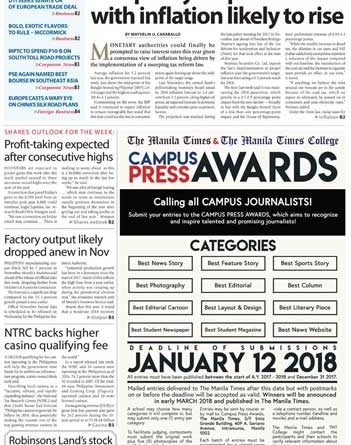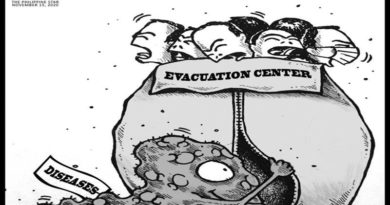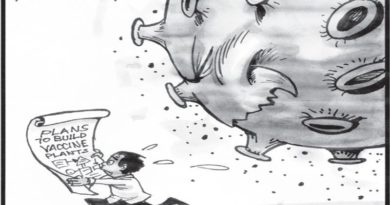MANILA: ECONOMY – BSP policy response seen with inflation likely to rise
Monetary authorities could finally be prompted to raise interest rates this year given a consensus view of inflation being driven by the implementation of a sweeping tax reform law.
Average inflation hit 3.2 percent last year, the government reported last week, just above the mid-point of the Bangko Sentral ng Pilipinas’ (BSP) 2.0-4.0 target and the highest reading since 2014’s 4.1 percent.
Commenting on the news, the BSP said it continued to expect inflation to remain manageable but noted that this year could see the rise in consumer prices again firming up above the mid-point of the target range.
Last November, the central bank’s policymaking Monetary Board raised its 2018 inflation forecast to 3.4 percent from 3.2 percent, citing higher oil prices, an expected increase in domestic liquidity and a weaker peso as primary factors.
The projection was retained during the last policy meeting for 2017 in December, just ahead of President Rodrigo Duterte’s signing into law of the Tax Reform for Acceleration and Inclusion (Train) Act that took effect at the start of this year.
Nomura Securities Co. Ltd. expects the law’s implementation to propel inflation past the government’s target, last year forecasting a 4.3-percent result for 2018.
The firm last week said it was maintaining the 2018 projection, which pencils in a 0.7-0.9 percentage point impact from the new tax law — broadly in line with the Bangko Sentral claim of a less than one percentage-point impact and the House of Representatives’ preliminary estimate of 0.85-1.2 percentage points.
“While the smaller increase in diesel tax, the dilution in car taxes and VAT (value-added tax) exemptions represent a reduction of the impact compared with our baseline, the introduction of the coal tax and the increase in cigarette taxes provide an offset, in our view,” it noted.
“If anything, we believe the risks around our forecast are to the upside because of the coal tax, which we expect to ultimately be passed on to consumers and raise electricity rates,” Nomura added
Under the Train law, excise taxes for diesel will go up to P2.50 per liter this year, the rate for the cheapest vehicles was doubled from 2 percent but reduced for higher-end and luxury vehicles; the tax on coal will be raised sharply to P50/metric ton and the cigarette excise tax will rise by 16.7 percent from the 4 percent annual increase mandated from 2018 onwards under previous laws.
“This combines with our 2018 oil price assumption ($65 per barrel) and the output gap becoming more positive despite potential growth rising. Our earlier empirical work shows the output gap is a particularly important driver of core inflation,” Nomura said.
As such, the firm reiterated its view that monetary authorities would not be able to look through the risk of inflation breaching the target. Nomura forecast a total 100 basis points of policy rate hikes this year, at a rate of one 25-bp adjustment per quarter, to 4 percent.
It noted that in 2014 — the last time the central bank hiked rates — it was all about inflation risks, with the increases described by monetary authorities as a “pre- emptive response” to the likelihood of “a further upward shift” that could put the target at risk.
Nomura said demand-side pressures were even stronger today than in 2014 and thus inflation expectations were also likely to accelerate amid supply-side increases from oil prices and tax reforms.
“Some BSP officials have noted that the impact of the removal of quantitative restrictions on rice imports could provide a significant offset to headline inflation pressures. However, we believe there is still some uncertainty surrounding the implementation of this policy change (it requires legislation), compared with the impact of already-passed tax reform,” it said.
“Moreover, quantitative restrictions will also be replaced by higher tariffs. Importantly, we think it is prudent for BSP to focus on second-round effects when supply-side drivers exist,” it added.
In this context, Nomura believes the tax reforms will have a greater impact on second-round effects than rice import policy changes. The fuel tax has a greater indirect effect on the consumer price index basket and tax cuts could increase domestic demand.
“Encouragingly, more recent statements from BSP suggest it is starting to acknowledge this — Deputy Governor Diwa Guinigundo mentioned that while on their own the tax reforms do not necessarily warrant an automatic response, monetary policy may be adjusted if BSP sees evidence of second-round effects and a risk of a wage-price spiral, supporting our policy rate forecasts,” it concluded.
BMI Research, meanwhile, also expects inflation to face upside pressures over the coming months because strong credit growth and higher commodity prices.
“We are forecasting inflation to average 4 percent in 2018 and this means that real interest rates will dip into negative territory,” it said in a report.
The Fitch Group unit said that with the US Federal Reserve set to continue its rate hiking cycle in 2018, the BSP is likely to hike rates by 50 bps to 3.50 percent to safeguard currency and macroeconomic stability.
Australia’s ANZ Research also sees upside risks to its 2018 inflation forecast of 3.5 percent, saying that even before the changes in tax rates, upward adjustments to public transport fares were imminent.
It said the implementation of the first package of tax reforms would likely add to price pressures, particularly for transport, utilities, tobacco and sweetened beverages.
“We expect these adjustments to push 2018 inflation to above the upper limit of the central bank’s 2 to 4 percent target range. Average inflation has not breached the upper bound of the target range in eight years,” it noted.
ANZ pointed out that underlying imbalances, including rapid credit expansion and elevated trade deficits, warrant a policy response of two rate hikes of 25 bps each in March and May.
Standard Chartered, for its part, retained its view that consumer prices were not a worry for the Philippines as inflation would remain within target at an average 3.5 percent this
“We expect inflation to edge up in 2018, boosted by domestic demand and the tax reform. We estimate higher infrastructure investment and the tax reform to add about 0.3 to 0.5 ppt (percentage point) to headline inflation,” it said.
COURTESY:
BUSINESS TIMES
B
NOTE : All photographs, news, editorials, opinions, information, data, others have been taken from the Internet ..aseanews.net | [email protected] |
For comments, Email to :
Pahulu Gan – Contributor | [email protected]









